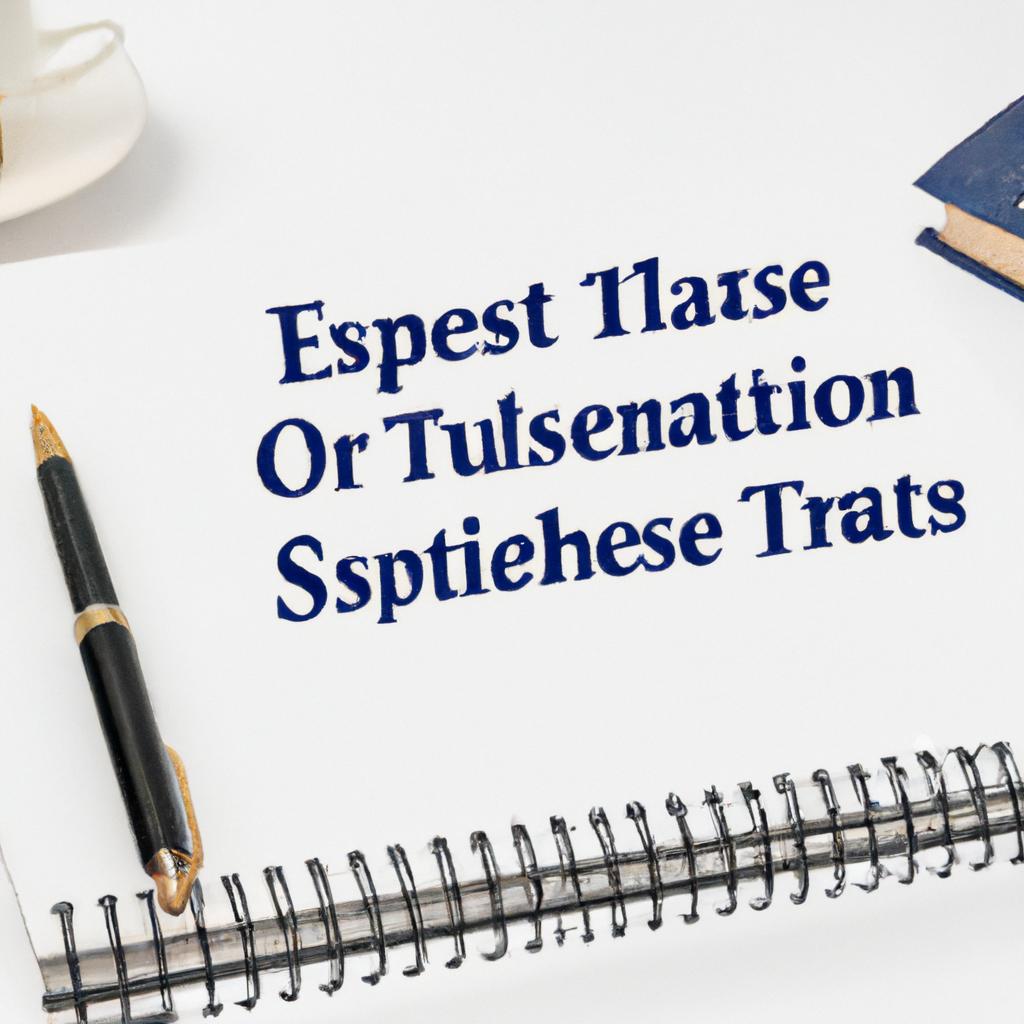When contemplating the distribution of one’s assets, the debate between utilizing a trust or naming a beneficiary often arises. As seasoned legal professionals at Morgan Legal Group in New York City, we understand the complexities and nuances involved in estate planning. In this article, we will delve into the question: Is a trust superior to a beneficiary designation? By examining the advantages and disadvantages of each option, we aim to provide insight and guidance for those seeking to secure their legacy effectively.
Key Differences between Trusts and Beneficiaries in Estate Planning
When it comes to estate planning, choosing between a trust and a beneficiary can be a tough decision. Both options have their own set of advantages and disadvantages that need to be carefully considered. Understanding the key differences between trusts and beneficiaries is essential in making an informed decision that aligns with your estate planning goals.
One major difference between trusts and beneficiaries is the level of control that you have over your assets. With a trust, you can specify how and when your assets will be distributed to your loved ones. This level of control can help ensure that your assets are managed and distributed according to your wishes. On the other hand, designating beneficiaries in your estate plan gives them immediate access to your assets upon your passing, without any restrictions or guidelines in place. This lack of control can potentially lead to mismanagement or misuse of your assets.

Important Considerations when Choosing between Trusts and Beneficiaries
When deciding between trusts and beneficiaries for your estate planning, there are several important considerations to take into account. Both options have their pros and cons, and it’s crucial to weigh them carefully before making a decision. Here are some key factors to consider:
- Control: With a trust, you have more control over how your assets are distributed and managed after your passing. You can specify detailed instructions and conditions for the distribution of your assets, whereas beneficiaries have more flexibility and autonomy in how they use their inheritance.
- Privacy: Trusts offer a higher level of privacy compared to beneficiaries. When assets are distributed through a trust, the details remain private and are not disclosed in public records, providing more confidentiality for your beneficiaries.
Additionally, it’s important to consider the cost and complexity of setting up and maintaining a trust versus leaving assets directly to beneficiaries. Trusts can be more expensive to establish and maintain, and they require ongoing management to ensure compliance with legal requirements. On the other hand, leaving assets to beneficiaries can be a simpler and more cost-effective option, especially for smaller estates.
Ultimately, the decision between trusts and beneficiaries will depend on your specific goals and priorities for your estate planning. It’s advisable to consult with an experienced estate planning attorney, like Morgan Legal Group in New York City, to help you navigate the complexities of trusts and beneficiaries and make an informed decision that aligns with your wishes.

Factors to Keep in Mind for Long-Term Wealth Preservation
In determining whether a trust is better than a beneficiary for long-term wealth preservation, several factors must be considered. One important factor is control. With a trust, the grantor can specify how and when assets are distributed to beneficiaries, providing a level of control that may not be possible with a direct beneficiary designation. This can be particularly important in situations where beneficiaries may not be financially responsible or where there are concerns about protecting assets from creditors or potential lawsuits.
Another factor to consider is privacy. Unlike a will, which becomes a matter of public record during probate, a trust allows for assets to be distributed privately and without court intervention. This added layer of privacy can be beneficial for families who wish to keep their financial affairs confidential. Additionally, trusts can offer tax benefits and protection from estate taxes, making them a valuable tool for long-term wealth preservation.

Expert Recommendations for Structuring Your Estate Plan with Trusts or Beneficiaries
When considering how to structure your estate plan, the decision between using a trust or naming beneficiaries can be a critical one. Both options have their advantages and drawbacks, and the best choice will depend on your specific circumstances and goals. Here are some expert recommendations to help you navigate the decision-making process:
Trusts:
-
Provide more control over how assets are distributed
-
Can help minimize estate taxes
-
Offer privacy by avoiding probate
-
Provide protections for beneficiaries, such as minors or individuals with special needs
Beneficiaries:
-
Simplify the distribution process
-
Avoid the costs associated with setting up and maintaining a trust
-
Allow for greater flexibility in changing beneficiaries
-
Provide a more straightforward approach for smaller estates
Q&A
Q: What is the difference between a trust and a beneficiary?
A: A trust is a legal arrangement where assets are held by a trustee for the benefit of a specific person or group of people, known as beneficiaries. A beneficiary is the individual or entity that will receive the assets from the trust.Q: Why would someone choose a trust over a beneficiary?
A: One reason someone may choose a trust over a beneficiary is for greater control and protection of assets. A trust allows for specific instructions on how and when assets are distributed, while also providing added privacy and protection from creditors.Q: Are there any drawbacks to using a trust instead of a beneficiary?
A: One drawback to using a trust is the potential for higher administrative costs and fees compared to simply naming a beneficiary. Additionally, trusts can be complex legal entities that require careful planning and management.Q: How does one determine whether a trust or beneficiary is the best option for their estate planning?
A: The decision between a trust and a beneficiary ultimately depends on individual goals and circumstances. Consulting with a legal or financial advisor can help determine the most suitable option based on factors such as asset protection, estate taxes, and distribution preferences.In Summary
In conclusion, the decision of whether a trust is better than a beneficiary ultimately depends on the specific circumstances and goals of the individual. Both options offer unique advantages and considerations that should be carefully weighed before making a final decision. Whether you choose to establish a trust or designate a beneficiary, it is important to seek advice from a legal or financial professional to ensure that your assets are protected and managed in accordance with your wishes. Whatever path you choose, may it bring you peace of mind and security for the future.
 When it comes to estate planning, one of the most common questions that people ask is whether a trust is better than a beneficiary. Both options have their own set of advantages and disadvantages, so it’s essential to understand their differences before making a decision. In this article, we will delve into the topic of trusts versus beneficiaries and help you determine which option is suitable for your circumstances.
When it comes to estate planning, one of the most common questions that people ask is whether a trust is better than a beneficiary. Both options have their own set of advantages and disadvantages, so it’s essential to understand their differences before making a decision. In this article, we will delve into the topic of trusts versus beneficiaries and help you determine which option is suitable for your circumstances.What is a Trust?
A trust is a legal arrangement where a trustee holds and manages assets on behalf of the beneficiary. It is created to ensure that assets are protected and distributed according to the trust creator’s wishes. The trust is established by the grantor, who is the person creating the trust, and the trustee, who is responsible for managing the assets. The beneficiary is the party who will receive the benefits from the trust, and they can be an individual, an organization, or even a charity.
Types of Trusts:
- Living Trust: This type of trust is created while the grantor is still alive, and it can be revocable or irrevocable. A revocable trust allows the grantor to change the trust terms or even revoke it entirely. On the other hand, an irrevocable trust cannot be altered or revoked once it is created.
- Testamentary Trust: This trust is created through the grantor’s will to come into effect after their death. It is revocable until the grantor’s death, and it can be used to distribute assets to beneficiaries, such as minor children or disabled individuals.
- Special Needs Trust: This type of trust is designed to provide financial support to individuals with special needs without affecting their eligibility for government benefits.
What is a Beneficiary?
A beneficiary is an individual, organization, or charity who will receive assets from a trust or will. They have no control over the assets until they are distributed, and they cannot make any changes to the trust terms. The assets are managed by a trustee until they are distributed to the beneficiary.
Difference Between a Trust and a Beneficiary:
- Control over Assets: One of the major differences between a trust and a beneficiary is the level of control over assets. In a trust, the grantor can specify how and when the assets will be distributed to the beneficiary. However, in the case of a beneficiary, they have no control over the assets until they are distributed to them.
- Asset Protection: A trust provides greater asset protection compared to a beneficiary. Assets held in a trust are insulated from creditors, lawsuits, and other potential risks. On the other hand, if the beneficiary is an individual, the assets can be at risk of being seized by creditors or in a divorce settlement.
- Privacy: A trust offers more privacy than a will or a beneficiary. Trusts are not publicly disclosed, and the details of the trust, including assets and beneficiaries, remain private. In contrast, a will and beneficiary are public documents that can be accessed by anyone.
- Avoiding Probate: Another advantage of having a trust is that it avoids probate, a legal process for verifying a will and distributing assets. Probate can be a lengthy and expensive process, but with a trust, assets do not go through probate and can be distributed seamlessly to the beneficiaries.
- Flexibility: A trust offers more flexibility than a beneficiary. The grantor can specify the terms of the trust and how and when the assets will be distributed to the beneficiary. A beneficiary, however, has no control over the assets and must follow the terms as specified by the trust or will.
Benefits of a Trust:
- Asset protection against creditors and other risks
- Greater control over how and when assets are distributed
- Avoidance of probate
- Enhanced privacy of estate plan
- Flexibility in terms of trust terms and distribution of assets
- Provides for individuals with special needs while maintaining their eligibility for government benefits.
Benefits of a Beneficiary:
- Simple and cost-effective way to leave assets to your loved ones
- Can be named as a beneficiary in various accounts, such as life insurance, retirement accounts, etc.
- Can hold assets for minors or disabled individuals
- Can ensure that assets are distributed according to the will or trust terms.
Which Option is Better for You?
The answer to this question depends on your individual circumstances and goals. If you are looking for more control over your assets and want to protect them from potential risks, a trust may be a better option for you. However, if you have a simple estate plan and want to leave assets to your loved ones, a beneficiary may be the more practical and cost-effective option.
Practical Tips when Choosing between a Trust and Beneficiary:
- Consider your assets and goals: Before making a decision, it’s crucial to assess your assets and determine your goals. If you have considerable assets and want to pass them down to your beneficiaries, a trust may be a more suitable option. On the other hand, if you have a simple estate and small assets, a beneficiary may suffice.
- Consult with a professional: Estate planning can be complex, and it’s essential to seek advice from legal and financial professionals. They can help you understand the intricacies of trusts and beneficiaries and guide you in making the right decision.
- Review your plan periodically: Estate planning is not a one-time process; it requires regular reviews and updates. As your circumstances change, your estate plan should be updated accordingly to ensure it still aligns with your goals.
In conclusion, both a trust and a beneficiary have their own set of advantages and disadvantages. It’s essential to evaluate your goals and assets to determine which option is suitable for you. Seeking professional advice can be beneficial in making an informed decision and ensuring your estate planning meets your needs and goals. Remember to review and update your plan regularly to ensure it remains relevant.

